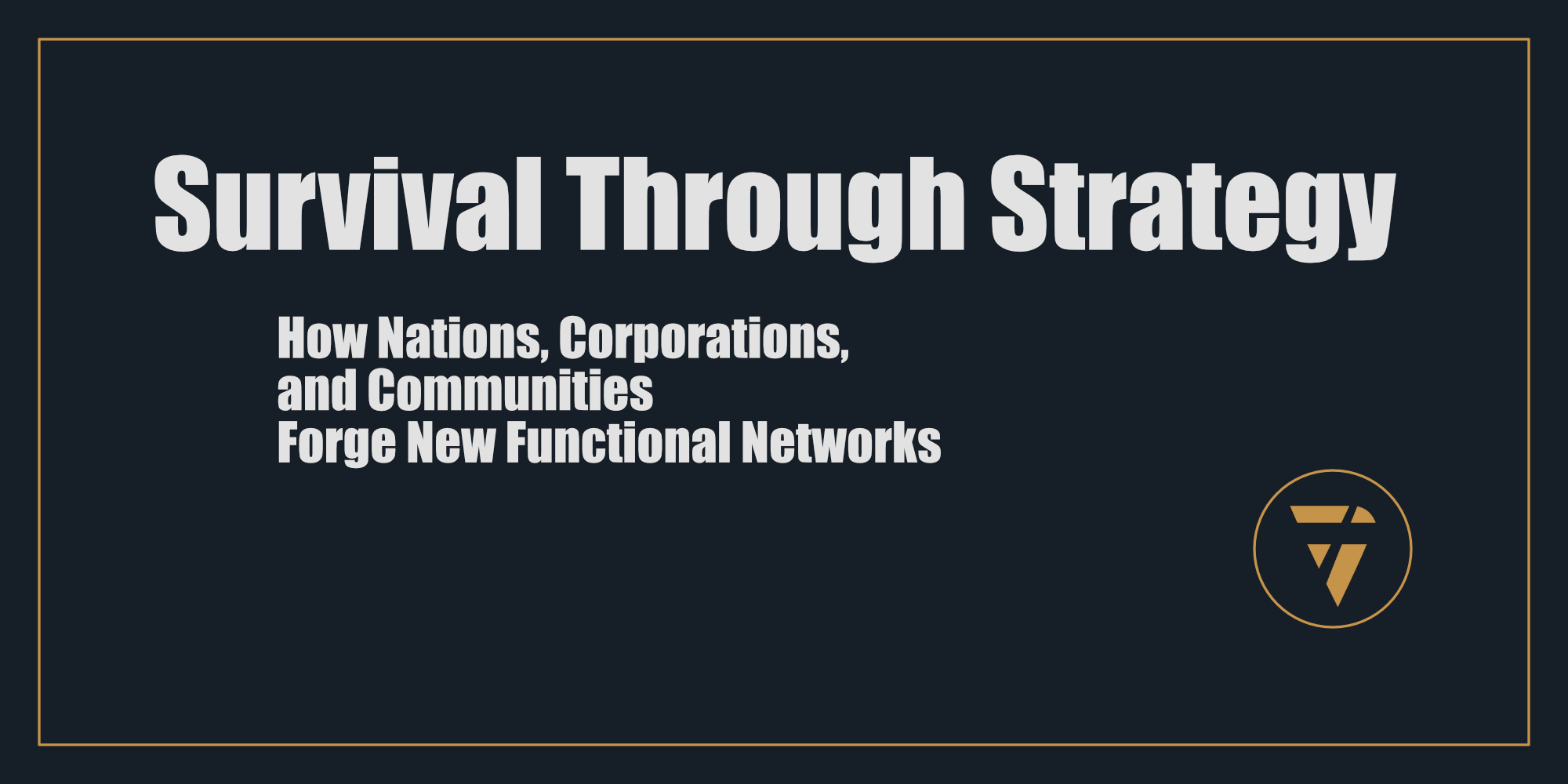Survival Through Strategy

How Nations, Corporations, and Communities Forge New Functional Networks
History has always belonged to the well-connected. These are the new rules of survival.
Empires did not rise through isolation; they expanded through trade, diplomacy, and strategic alliances. Corporations do not dominate markets by standing alone; they integrate supply chains, leverage partnerships, and outmaneuver competition through networks. Communities do not thrive in crisis by retreating inward; they build resilience by fostering collaboration, pooling resources, and strengthening ties.
The same is true now, perhaps more than ever.
We live in a time of turbulence. Global markets are in flux, political alliances are shifting, and entire industries are being rewritten by technology, war, and economic upheaval. The old structures—whether national economies, multi-national trade systems, or local communities—are breaking under pressure.
But collapse is not inevitable.
For those who understand the game, crisis is opportunity. Resilience is not found in isolation; it's built through strategic connection. The nations, businesses, and communities that thrive in this new era will be those who form, sustain, and expand functional networks—dynamic, adaptable alliances that serve as force multipliers in uncertain times.
- Nations that can build alternative economic frameworks will escape dependency and assert true sovereignty.
- Corporations that cultivate strong ecosystems will outperform those who compete alone.
- Communities that prioritize connection will navigate crisis better than those that rely on outdated institutions.
Survival is not about resources alone, it's about who you're connected to, how you communicate, and the strength of the networks you build.
Those who understand this will lead. Those who don’t will be left behind.
1. Strategic Networks: The Power of Connection in a Fractured World
Networks—whether diplomatic, corporate, or communal—are the most powerful survival mechanism available. The more integrated, adaptive, and purpose-driven a network, the more resilient it becomes.
Nations: The Rise of Alternative Global Orders
The days of a single dominant superpower dictating the world order are over. The U.S.-led global system is fragmenting, and with it, the alliances that once seemed permanent. In response, new coalitions are emerging—not based on ideology, but on mutual benefit and strategic necessity.
- BRICS (Brazil, Russia, India, China, South Africa) is forming a counterweight to Western financial control.
- The Gulf states are creating independent trade and military partnerships, hedging between powers.
- Africa is bypassing the IMF and World Bank, securing direct investment from Asia and the Middle East.
The key lesson? Nations that depend on a single economic or security partner are vulnerable. The future belongs to those that can integrate into multiple networks, securing trade, defence, and technological independence without reliance on any one power.
Corporations: From Competitive to Co-operative Capitalism
The idea that corporations must always compete is outdated. The strongest businesses are not those that fight for dominance alone, but those that build strategic ecosystems.
- Tesla doesn’t succeed just by making cars; it builds a supply chain of battery makers, AI developers, and charging networks.
- Amazon doesn’t just sell products; it controls logistics, cloud computing, and payment infrastructure.
- Tech companies don’t just build products; they form alliances with governments, research institutions, and private investors.
In volatile markets, the companies that develop resilient partnerships, integrate across industries, and leverage their networks will not only survive—they will dictate the terms of the future economy.
Communities: Strength Through Local and Digital Networks
Resilience is not just about global strategies; it starts at the local level. The communities that thrive during crisis are those that organize, communicate, and share resources.
- During financial collapse, decentralized trade networks sustain local economies.
- During political instability, grassroots organizations maintain social stability.
- During natural disasters, local supply chains ensure survival where governments fail.
The shift is already happening. Localism is rising. Digital communities are expanding. Decentralized economic systems (crypto, co-operative ownership, alternative finance) are growing. In a world where large institutions are failing, people are rebuilding from the ground up.
The future belongs to those who are connected.
2. The Core Principles of Building Strategic Networks
To create, sustain, and benefit from functional networks, three key principles must be understood:
1. Open, But Selective: Who You Align With Matters
Not all connections are equal. Being connected is important, but being connected to the right people is everything.
- Nations must choose trade partners that provide leverage, not dependency.
- Corporations must integrate with partners that enhance stability, not introduce risk.
- Communities must cultivate ties that enhance resilience, not drain resources.
Strategic alliances must be purpose-driven, not just convenient.
2. Adaptive, Not Static: Build for Change, Not Stability
The mistake many make is building networks for stability in an unstable world. True resilience comes from adaptability.
- Nations must be willing to pivot alliances when conditions shift.
- Businesses must be ready to reinvent their models as technology evolves.
- Communities must develop decentralized support systems that don’t rely on any one institution.
The best networks evolve. Those that stay static collapse.
3. Leverage Communication: The Strength of the Network is the Strength of Its Information
A network is only as powerful as its ability to move knowledge, intelligence, and strategy.
- Nations that control global information flows (data, media, intelligence networks) dictate geopolitical outcomes.
- Corporations that dominate communication channels (social platforms, news, financial networks) shape entire industries.
- Communities that prioritize transparency, information-sharing, and rapid response outperform those that rely on slow, outdated institutions.
Information is not just power, it's survival.
3. Canada’s Role: The Neutral Connector in a World of Fragmentation
Canada is uniquely positioned to become the interconnector in an era of shifting power. With deep ties to the West, access to emerging markets, and control over critical resources, Canada can leverage its position to build an alternative strategic network that benefits both itself and its partners.
1. Trade and Supply Chain Security
- Expand beyond U.S. reliance by integrating with Europe, South America, and ASEAN.
- Strengthen critical mineral supply chains to become indispensable in global tech production.
- Invest in regional trade alliances that reduce reliance on American economic policy.
2. Digital and Technological Influence
- Build a tech corridor between Canada, Europe, and Japan—creating a third power bloc in AI, cybersecurity, and quantum computing.
- Position itself as a global leader in decentralized finance, offering alternatives to both U.S. and Chinese-dominated systems.
- Use regulatory stability to attract high-level data security partnerships, making Canada a neutral ground for corporate and governmental cybersecurity infrastructure.
3. Strategic Energy Leadership
- Establish a pan-Atlantic energy alliance with Europe, making Canada the primary non-U.S. supplier of LNG and renewables.
- Strengthen Arctic cooperation with Nordic nations to control future energy shipping routes.
- Develop a Gulf-Canada-Asia energy network, reducing dependency on U.S. infrastructure.
The Future is Networked
In the new era of global realignment, independence is a myth. Nations, businesses, and communities that operate in silos will fail. Those who build functional, adaptable, strategic networks will shape the world’s future.
The winners of tomorrow are not the biggest, nor the strongest—they are the best connected.
Who is Canada connected to? Who are you connected to?
Your survival will be determined by your strategy.
Talk to each other.
This is what I’m working on. Tell me what you think, I enjoy the conversation! Subscribe and follow the work in real time.
Thanks!
B

The best position in a crisis? Not strength. Not wealth. Leverage. Those with the best connections dictate the terms.
PS -






